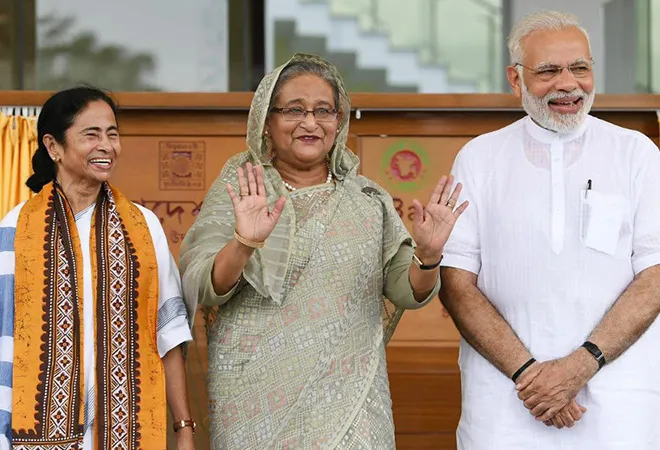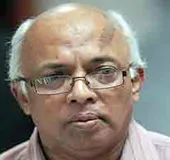
Bengalis on the Bangladeshi side of the border have been keenly observing the election campaign on the other side. Bangladeshis are keeping their fingers crossed as they watch politics play out in West Bengal, with Chief Minister Mamata Banerjee pitted against the big guns from Delhi, Prime Minister Narendra Modi and Home Minister Amit Shah. Bangladeshi people have in the past generally evinced interest in Indian elections at the national level, but the extent to which politics has been turning out in West Bengal has for them been rather mystifying.
With Modi and Shah both plunging into the campaign in favour of their party candidates, Bangladeshis have begun to wonder about the last time an Indian Prime Minister and Home Minister have engaged in a personal, direct electoral battle with a party holding power in one of the Indian states. From that point of view, a fairly good number of India watchers in Dhaka silently hope that Mamata Banerjee will ride out the storm and go on to a new term as Chief Minister.
And yet there is the other point which assails Bangladeshis. They do not forget that Banerjee has been an impediment to a resolution of the dispute between Bangladesh and India over the sharing of the waters of the River Teesta. It was Ms. Banerjee who scuttled the chances of a solution to the problem when she backed out of Prime Minister Manmohan Singh’s delegation to Dhaka in 2011, effectively killing the chances of a deal on the river issue. At another end, Narendra Modi’s consistent cooperation with the government of Prime Minister Sheikh Hasina has been appreciated, a hint of which was his presence as chief guest at Bangladesh’s 50th independence anniversary celebrations in Dhaka last month.
Thus, there is this dichotomy in Bangladeshi thought where feelings towards Modi and Mamata Banerjee are concerned. The Chief Minister has been a recipient of Bangladeshi goodwill in recent years, an instance being the gift of hilsa fish sent to her by Bangladesh’s leader, Sheikh Hasina. Mamata Banerjee’s feisty nature has impressed many Bangladeshis, though the Teesta imbroglio remains a cause of pain for them. The Chief Minister’s emphasis on Bengali tradition through her invocation of ‘Joi Bangla’—the war cry instrumental in Bangladesh’s War of Liberation in 1971—has touched a chord among many Bangladeshis, though they are careful to separate the context of the slogan raised by Mamata Banerjee from that popularised by Bengali nationalists in pre-1971 Pakistan.
The media and public intellectuals in Bangladesh have scrupulously stayed away from voicing any opinion on the current campaign in West Bengal, though one can certainly expect a torrent of commentaries to flow once the results of the elections have formally been announced. What does worry sections of Bangladeshis, who have despite the trauma of the division of Bengal during the Partition in 1947 shared a common cultural tradition with West Bengal, is the degree to which a BJP triumph at the elections might affect the secular Bengali culture Bengalis on both sides of the divide have proudly upheld. Plainly, the worry is about Hindutva and about the de-secularisation of Bengali culture should the TMC be beaten at the election.
Bangladeshis have historically held such West Bengal political figures as BC Roy, Siddhartha Sankar Ray, Jyoti Basu, and Buddhadeb Bhattacharya in deep respect. Their affection for Pranab Mukherjee has been abiding. Their feelings toward Mamata Banerjee have been mixed, for obvious reasons. Even so, their fears that a BJP electoral victory might hinder the natural course of a common Bengali heritage are unmistakable. Besides, when they observe the political course taken by men like the actor Mithun Chakravarty and all those who till the other day were with Mamata Banerjee but have now ditched her, they are indeed a tad surprised, if not shocked.
Where the BJP is concerned, Bangladeshis have had little reason to question Narendra Modi’s policies vis-à-vis Bangladesh. His expressions of friendship for Dhaka have been well pronounced and appreciated. But Bangladeshis have been disturbed by Amit Shah’s comments on what he sees as illegal migration from Bangladesh. His reference to them as ‘termites’ and, only days ago, his query as to why Bangladeshis make their way to India if things are okay in Bangladesh have raised hackles in Dhaka.
For Bangladeshis, the dilemma as India prepares to let the world in on who has beaten whom at the West Bengal elections (and that is yet weeks away) is two-fold. In the first place, a TMC win will gladden hearts in Dhaka but at the same time will mean a fresh delay in the two countries reaching an understanding on such issues as the Teesta. In the second place, a BJP triumph will be seen as a sign that West Bengal has shifted from its historically acclaimed secular politics to a re-engineering of it in the shape of Hindu nationalism.
It is wait-and-watch time in Dhaka.
The views expressed above belong to the author(s). ORF research and analyses now available on Telegram! Click here to access our curated content — blogs, longforms and interviews.




 PREV
PREV


